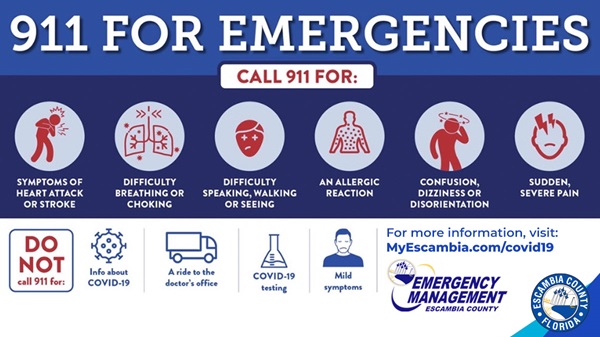Escambia County would like to remind residents to only call 9-1-1 for emergencies. There have been many requests to 9-1-1 that do not involve true emergencies, which overloads the 9-1-1 system with non-emergency calls and uses ambulance resources.
In the event of an emergency, call 9-1-1 immediately from any phone. An emergency is any situation that requires immediate assistance from the police, fire department or ambulance. Examples include:
- A fire
- A crime, especially if in progress
- A car crash, especially if someone is injured
- A medical emergency, such as someone who is unconscious, gasping for air or not breathing, experiencing an allergic reaction, having chest pain, having uncontrollable bleeding, or any other symptoms that require immediate medical attention
IMPORTANT: If you are not sure whether the situation is a true emergency, officials recommend calling 9-1-1 and letting the call-taker determine whether you need emergency help.
"Calling 9-1-1 in an emergency can save lives and bring immediate help by first responders," said Interim Public Safety Director Eric Gilmore. "Knowing how and when to make a 9-1-1 call can make all the difference in a critical situation. It's important that first responders are being used for true emergencies."
Do not call 9-1-1 for non-emergent situations such as:
- Requests for Information: Calls for information, such as directory assistance, driving directions or road closures, should not be made to 9-1-1. Call 3-1-1 or visit Contact Us (myescambia.com).
- Information about COVID-19: COVID-19 information for Escambia County can be found here: myescambia.com/covid19. If you have come in close contact with someone who has been diagnosed with the Coronavirus or have symptoms such as fever or cough, please call your healthcare provider - not 9-1-1.
- Non-life threatening medical situations: Minor injuries or medical conditions that do not require immediate medical care do not warrant a 9-1-1 call. If you or someone you know has mild food poisoning, a slight fever, nausea, or a minor cut, consider calling a physician or going to urgent care.
In an emergency situation that warrants a call to 9-1-1, be prepared to answer the call-taker’s questions, which may include:
- The location of the emergency, including the street address
- The phone number you are calling from
- The nature of the emergency
- Details about the emergency, such as a physical description of a person who may have committed a crime, a description of any fire that may be burning, or a description of injuries or symptoms being experienced by a person having a medical emergency
For more information, visit our When to Call 911 resource page.

